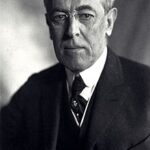President Woodrow Wilson signed the Clayton Antitrust Act into law on October 15, 1914. This landmark legislation addressed critical gaps in the Sherman Antitrust Act of 1890.
The Decision Behind Corporate Reform
Wilson recognized that existing antitrust laws failed to prevent specific monopolistic practices. The Clayton Antitrust Act prohibited price discrimination, exclusive dealing contracts, and interlocking directorates. These practices had allowed corporations to crush smaller competitors unfairly. 📊 The Act specifically banned tying arrangements that forced customers to buy unwanted products. It also prevented mergers that substantially reduced competition in any market.
Labor Protection Revolution
The legislation included groundbreaking protections for organized labor. Section 6 declared that “labor is not a commodity or article of commerce.” This provision exempted unions from antitrust prosecution when engaging in lawful activities. ⚠️ Previous court decisions had treated union strikes as illegal conspiracies in restraint of trade. The Clayton Act explicitly protected workers’ rights to strike, boycott, and organize peacefully.
Progressive Era Achievement
Wilson’s decision reflected his New Freedom campaign promises to break up concentrated economic power. 💰 The Act complemented the Federal Trade Commission Act, also passed in 1914, creating comprehensive corporate oversight.
Impact:
The Clayton Antitrust Act fundamentally transformed American business practices and labor relations for generations. Its immediate effects reshaped corporate behavior across multiple industries.
Economic Competition Restored
The legislation successfully prevented many anti-competitive mergers and business practices. Companies could no longer engage in predatory pricing to eliminate smaller rivals. 📉 Price discrimination schemes that favored large buyers over small businesses became illegal. This leveled the playing field for entrepreneurs and small enterprises. The Act’s merger restrictions prevented the formation of new monopolies. Industries like steel, oil, and railroads faced increased scrutiny and regulation.
Labor Movement Empowerment
The Clayton Antitrust Act became known as “labor’s Magna Carta” among union organizers. Workers gained unprecedented legal protections for collective bargaining and strikes. 🔥 Court injunctions against peaceful labor activities declined significantly after 1914. Union membership grew substantially during the following decades. The Act established the foundation for modern American labor law.
Long-term Constitutional Legacy
The legislation demonstrated federal power to regulate interstate commerce effectively. It provided a constitutional framework for subsequent New Deal programs. 🌍 The Act influenced antitrust legislation in other democratic nations worldwide. Modern antitrust enforcement still relies on Clayton Act provisions today. The Supreme Court has consistently upheld its core principles for over a century. Consumer protection advocacy traces its roots to Wilson’s corporate regulation initiatives.
